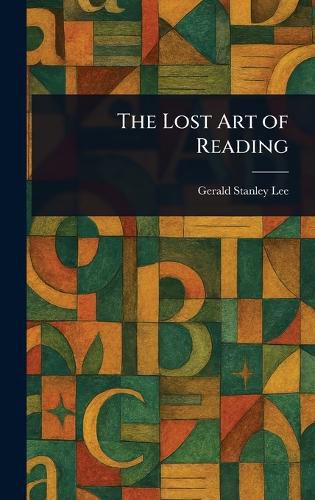Readings Newsletter
Become a Readings Member to make your shopping experience even easier.
Sign in or sign up for free!
You’re not far away from qualifying for FREE standard shipping within Australia
You’ve qualified for FREE standard shipping within Australia
The cart is loading…






This title is printed to order. This book may have been self-published. If so, we cannot guarantee the quality of the content. In the main most books will have gone through the editing process however some may not. We therefore suggest that you be aware of this before ordering this book. If in doubt check either the author or publisher’s details as we are unable to accept any returns unless they are faulty. Please contact us if you have any questions.
Rediscover "The Lost Art of Reading" by Gerald Stanley Lee, a compelling exploration into the profound power of books and the enriching experience of reading itself. This timeless work delves into the vital connection between literature, self-improvement, and the pursuit of success. Lee examines reading not merely as a passive activity, but as an active and transformative engagement that hones our minds and shapes our understanding of the world.
A thoughtful treatise on writing and reading, this book encourages a deeper appreciation for the written word. It inspires readers to cultivate a more meaningful relationship with literature and to unlock the potential for personal growth found within its pages. This meticulously prepared print edition ensures that Lee's insightful observations on the art of reading continue to resonate with those seeking knowledge and inspiration.
This work has been selected by scholars as being culturally important, and is part of the knowledge base of civilization as we know it.
This work is in the public domain in the United States of America, and possibly other nations. Within the United States, you may freely copy and distribute this work, as no entity (individual or corporate) has a copyright on the body of the work.
Scholars believe, and we concur, that this work is important enough to be preserved, reproduced, and made generally available to the public. We appreciate your support of the preservation process, and thank you for being an important part of keeping this knowledge alive and relevant.
$9.00 standard shipping within Australia
FREE standard shipping within Australia for orders over $100.00
Express & International shipping calculated at checkout
This title is printed to order. This book may have been self-published. If so, we cannot guarantee the quality of the content. In the main most books will have gone through the editing process however some may not. We therefore suggest that you be aware of this before ordering this book. If in doubt check either the author or publisher’s details as we are unable to accept any returns unless they are faulty. Please contact us if you have any questions.
Rediscover "The Lost Art of Reading" by Gerald Stanley Lee, a compelling exploration into the profound power of books and the enriching experience of reading itself. This timeless work delves into the vital connection between literature, self-improvement, and the pursuit of success. Lee examines reading not merely as a passive activity, but as an active and transformative engagement that hones our minds and shapes our understanding of the world.
A thoughtful treatise on writing and reading, this book encourages a deeper appreciation for the written word. It inspires readers to cultivate a more meaningful relationship with literature and to unlock the potential for personal growth found within its pages. This meticulously prepared print edition ensures that Lee's insightful observations on the art of reading continue to resonate with those seeking knowledge and inspiration.
This work has been selected by scholars as being culturally important, and is part of the knowledge base of civilization as we know it.
This work is in the public domain in the United States of America, and possibly other nations. Within the United States, you may freely copy and distribute this work, as no entity (individual or corporate) has a copyright on the body of the work.
Scholars believe, and we concur, that this work is important enough to be preserved, reproduced, and made generally available to the public. We appreciate your support of the preservation process, and thank you for being an important part of keeping this knowledge alive and relevant.